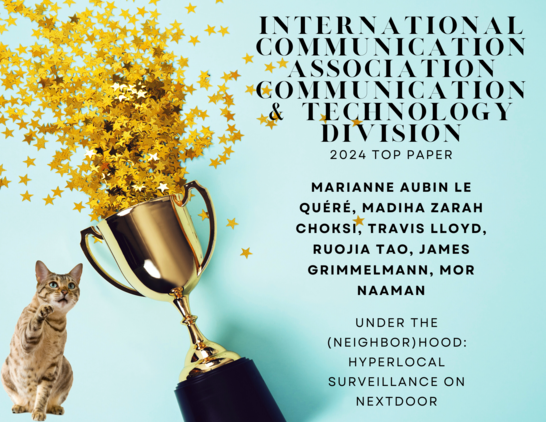@ericpsb thank you! yes, the pre-print is currently under peer review. we'll update it when it completes the process. in the meantime, feel free to cite the arXiv version!
PhD student at Cornell Tech + public interest technologist. Studying the health of the information ecosystem, especially the impact of generative AI. Past: engineering at Twitter, Amazon, Upsolve, Paladin PBC. he/him.
*NEW PAPER* How are online communities adapting to the presence of AI-generated content (AIGC)? To answer this question we collected the community rules for 300,000 public subreddits and identified rules governing the use of AI. /1
We offer a novel taxonomy of AI rule types and plan to make our datasets public after peer-review. Check out the preprint (w/ co-authors @Mor, Jennah and Tung) for more details about our findings and their implications: https://arxiv.org/abs/2410.11698 /fin
The number of subreddits with AI rules has nearly doubled over the last 12 months. Larger subreddits, as well as those devoted to art and celebrity topics, are the most likely to have such rules. Rules about AI most often focus on regulating the use of AI images and raise as justification concerns about quality and authenticity. /2
*NEW PAPER* How are online communities adapting to the presence of AI-generated content (AIGC)? To answer this question we collected the community rules for 300,000 public subreddits and identified rules governing the use of AI. /1
Under the (Neighbor)hood: Hyperlocal Surveillance on Nextdoor by Marianne Aubin Le Quéré, Madiha Zarah Choksi, Travis Lloyd, Ruojia Tao, James Grimmelmann, Mor Naaman
@marianne, @travislloyd, @jtlg, @Mor
#ica24
Check out the preprint (w/ co-authors @Mor and @reagle) for details of these (and other) findings and a discussion of the implications for the future of online communities: https://arxiv.org/abs/2311.12702 /fin
Our participants perceived both good and bad-faith motivations behind AIGC use. Some felt that it could increase participation, but others saw it as a serious threat to the health of their community. Without a foolproof way to identify AIGC, our participants rely on heuristics that will likely become less effective as generative AI technology improves. /2
*NEW PAPER* Since the launch of ChatGPT, online communities are reckoning with an influx of AI-generated content (AIGC). How are they dealing with it? To find out, I interviewed 15 community moderators from top subreddits to discuss how they and their communities are responding. /1
Hello Mastodon world! Let's give this decentralized social media thing a shot :)
